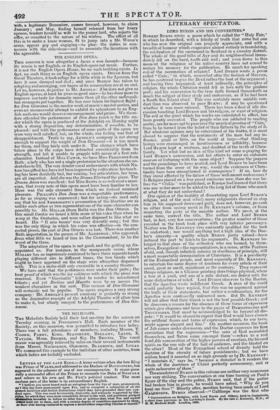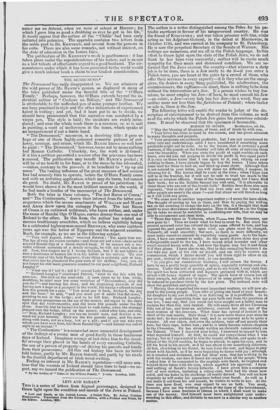LITERARY SPECTATOR.
LORD BYRON AND HIS CONVERTERS..
ROBERT BURNS wrote a poem which he called the "holy Fair," in which he described, with a felicity of truth that none but one who has seen the original can properly appreciate, and with a breadth of humour which evaporates almost entirely in translating, the celebration of the sacrament in Scotland in a country district. The whole of the good folks of Ayr and its neighbourhood imme- diately fell on the bard, tooth and nail ; and even down to this moment the religious of his native country have not ceased to malign his memory for the publication. So much for speaking evil of the ceremonies of religion! Lord BYRON wrote a poem called " Cain; " in which, somewhat after the fashion of MILTON, he has contrived to give the Devil rather the best of the argument; and having thus impugned, at least indirectly, the principles of religion, the whole Christian world fell in love with the profane poet ; and his conversion to the true faith formed thenceforth as much the subject of their study and endeavour, as if lie had been a South Sea Island chief. This was certainly more amiable con- duct than was observed to poor BURNS; it may be questioned whether it was more rational. There has been a deal of idle dis- cussion touching Lord BYRON and his religion, or want of religion. The evil or the good which his works are calculated to effect, has been greatly overrated. The people who are addicted to reading poetry, are far more apt to pass over the sceptical prosing of " Cain," than to be turned from the belief of their fathers by the study of it. But whatever opinion may be entertained of his works, it is most absurd to suppose that the sentiments of the man had any in- fluence, great or little, on the world at large—that thinking beings were encouraged in licentiousness or infidelity, because Lord Bvitost kept a mistress, and doubted of the truth of Chris- tianity. Yet what but an idea of this kind set some a-praying for Lord BYRON'S conversion, and led others to enter on elaborate courses of lecturing with the same object? Suppose the prayers and the preachings to have availed, and Lord BYRON to have been turned from the error of his way, would the evidences of Chris- tianity have been strengthened in consequence ? If so, how do they stand affected by the failure of these well-meant endeavours? Is Religion plahed on a less proud eminence now, than she was be- fore the " Childe " was published, or Europe had learned that there was one writer more to be added to the long list of those who mock at what they do not understand ? Our opinion of the inutility of dissertating upon Lord Byaox's religion, and of the zeal which many religionists showed to stop him in his supposed downward path, does ••not, heiwever, prevent us either from seeing merit in Dr. KENNEDY'S volume, or from respecting the piety of the amiable author. We must, at the same time, correct the title. The author and Lord BYRON had, in fact, very few conversations; the greater number of those recorded in the book took place with very inferior personages. Neither was Dr. KENNEDY very eminently qualified for the task he undertook; nor would anything but a high idea of the Doc- tor's sincerity—a quality which BYRON justly valued—have induced the poet to listen to his arguments. Dr. KENNEDY be- longed to that class of the orthodox who are termed, by them- selves, Evangelical—the representatives, in a sense, of the Puritans of old, and, though infinitely inferior in sturdiness of principle, still a most respectable denomination of Christians. It is a peculiarity of the Evangelical people, and most especially of Dr. KENNEDY, to entertain the same degree of fondness for every article of their creed, great or small, significant or the contrary. They represent things religious, as a Chinese painting does things physical, where a tree at a yard, and one at a mile distant, are drawn with the same distinctness of relief. Lord BYRON observes to the Doctor, that the Apostles wrote indifferent Greek. A man of the world would probably have replied, that this was no argument against the truth of their statements, but rather a confirmation, for the Apostles were confessedly unlearned men. But Dr. KENNEDY will not allow that their Greek is not the best possible Greek ; and he discovers a reason for the absence of those turns of expression which give elegance and force to the pages of DEMOSTHENES and THUCYDIDES, that must be acknowledged to be beyond all dis- pute : " It would be absurd to expect that God would have chosen the artificial forms and turns of expression which, to our taste, might appear elegant and fine." On another occasion, the book of Job comes under discussion, and the Doctor expresses his firm conviction that the expression—" the sons of God assembled themselves, and Satan came amongst them"—refers to a real bona fide convocation of the higher powers of creation, the blessed spirits on the one side of the hall of audience, and the blasted on the other! Most of the Evangelical schOol of divinity hold the doctrine of the eternity of future punishments; but we have seldom heard it asserted on so high grounds as by Dr. KENNEDY: " I maintain it," says he, " because a disbelief in it renders the whole of the doctrines of Christ perfectly unnecessary, and is quite. subversive of them." The anecdotes of BYRON in this volume are neither very numerous nor very striking. The conversation at one time turning on Paul's figure of the clay and the potter, BYRON said, that if the potter had broken him in pieces, he would have asked, " Why do you treat me thus ?" Shortly after, mention having been made of Lord _-,Cp.i.pfoRpz, BYRON observed—" Calthorpe was the first who • Conversations on Religion, with Lord Byron and Others, held in Cephalonia, a short time previous to his Lordship's Death. By the late J. Kennedy, M.D., of H. M. Medical Staff. London, 18E10. called me an Atheist, when we were at school at Harrow ; for which I gave him as good a drubbing as ever he got in his life.". It would appear that the author of the " Childe" had been early initiated into polemics. The appendix contains two letters from the noble poet to Dr. KENNEDY, and several from the persons- in his suite. There are also some remarks, not without interest, on the state of education in the Ionian Isles.
The publication of Dr. KENNEDY'S wcrk is posthumous : it has taken place under the superintendence of his widow, and is meant as a last tribute of affectionate regard to a good husband. The cir- cumstances under which it has been presented to the world would give a much inferior book a claim to our kindest consideration.



























 Previous page
Previous page